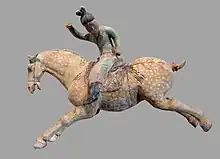
Sun Simiao (traditional Chinese: 孫思邈; simplified Chinese: 孙思邈; pinyin: Sūn Sīmiǎo; Wade–Giles: Sun Ssu-miao; died 682) was a Chinese physician and writer of the Sui and Tang dynasty. He was titled as China's King of Medicine (藥王; 药王, Yaowang) for his significant contributions to Chinese medicine and tremendous care to his patients.
Books
Sun wrote two books—Beiji qianjin yaofang ("Essential Formulas for Emergencies [Worth] a Thousand Pieces/Catty of Gold") and Qian Jin Yi Fang ("Supplement to the Formulas of a Thousand Gold Worth")—that were both milestones in the history of Chinese medicine, summarizing pre-Tang dynasty medicine.[1] The former listed about 5300 recipes for medicines, and the latter 2000. He also put forth the “Thirteen measures to keep health”, which claimed that actions like touching hair, rolling eyes, walking, and shaking heads improved health.[1]
Apart from this, he is known for the text "On the Absolute Sincerity of Great Physicians," often called "the Chinese Hippocratic Oath," or called "Dayi Heart", which comes from the first chapter of the first of the above-mentioned two books. This portion of the book is still a required reading for Chinese physicians. The following is an excerpt of the text:
A Great Physician should not pay attention to status, wealth or age; neither should he question whether the particular person is attractive or unattractive, whether he is an enemy or friend, whether he is a Chinese or a foreigner, or finally, whether he is uneducated or educated. He should meet everyone on equal grounds. He should always act as if he were thinking of his close relatives.[2]
The work Essential Subtleties on the Silver Sea (銀海精微, yínhǎi jīngwēi) was probably written by Sun Simiao. It was published at the end of the Yuan dynasty (1271−1368) and has had wide influence on the Chinese ophthalmology until today.[3]
In addition to his medical work, Sun also experimented in Chinese waidan external alchemy and may have been an initiated Daoist adept.[4] The sinologist Nathan Sivin says Sun Simiao's famous Danjing yaojue 丹經要訣 "Essential Formulas of Alchemical Classics"
[...] is as close to a modern laboratory handbook as anything we are likely to find in ancient literature. Following a preface and a catalogue of elixir names, there is a set of detailed specifications for necessities of the laboratory, including the liuyini 六一泥 "six-one" lute which was universally employed in Chinese pharmacology and alchemy for the hermetical sealing of reaction vessels. Finally, there are the recipes themselves: ingredients grouped at the beginning, with weight and advance preparation clearly noted, and perspicacious, concise directions for compounding and using the products.[5]
References
- 1 2 Sun Simiao, King of Medicine, Cultural China
- ↑ Sass, Hans-Martin (September 2005). "Emergency Management in Public Health Ethics: Triage, Epidemics, Biomedical Terror and Warfare" (PDF). Eubios Journal of Asian and International Bioethics 15. Archived from the original (PDF) on 2007-07-19.
- ↑ Agnes Fatrai, Stefan Uhrig (eds.): Chinese Ophthalmology – Acupuncture, Herbal Therapy, Dietary Therapy, Tuina and Qigong. Tipani-Verlag, Wiesbaden 2015, ISBN 978-3-9815471-1-5.
- ↑ Sivin 1968.
- ↑ Sivin 1968, p. 50.
Bibliography
- Sivin, Nathan (1968). Chinese Alchemy: Preliminary Studies. Cambridge: Harvard University Press.
External links
- Sun Simiao: Author of the Earliest Chinese Encyclopedia for Clinical Practice — Subhuti Dharmananda

